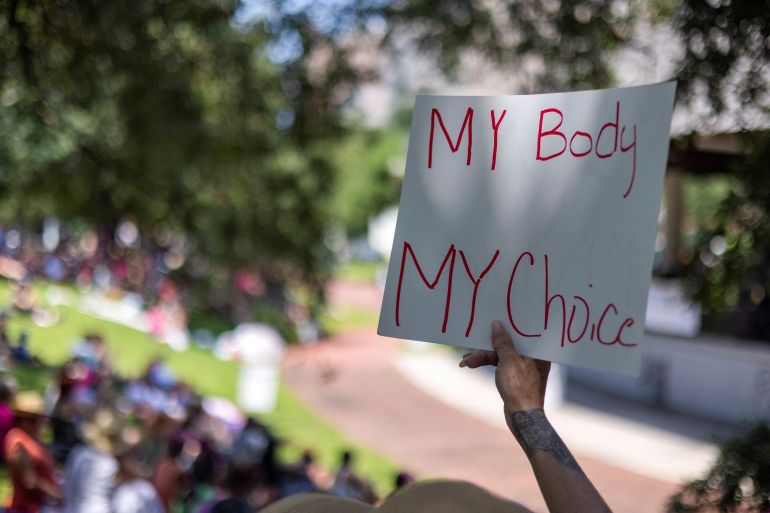Louisiana judge temporarily blocks ‘trigger’ abortion ban
Louisiana is one of 13 US states where ‘trigger laws’ ban or severely restrict abortion after Roe v Wade overturned.

A Louisiana judge has temporarily blocked the southern US state from enforcing laws banning abortion that were set to take effect after the United States Supreme Court overturned its landmark Roe v Wade abortion decision last week.
Louisiana is one of 13 states with “trigger laws” designed to ban or severely restrict abortions once Roe, which recognised a right to the procedure nationwide, was overturned.
Keep reading
list of 3 itemsRoe v Wade: Supreme Court decision highlights US abortion divide
Key takeaways from Supreme Court ruling overturning Roe v Wade
On Monday, Orleans Parish Civil District Court Judge Robin Giarrusso issued a temporary restraining order blocking Louisiana from carrying out its ban shortly after Hope Medical Group for Women in Shreveport, one of Louisiana’s three abortion clinics, sued.
“Abortion care is resuming in Louisiana,” the Center for Reproductive Rights, which filed the lawsuit on the clinic’s behalf, said after Giarrusso’s order. The judge set a July 8 hearing to decide whether to further block enforcement of the ban.
In filings in a state court, Hope Medical Group for Women said it was not disputing the state’s ability to restrict abortion after Friday’s Supreme Court decision.
It argued that Louisiana was not free to do so in a manner that violated its due process rights and that the state’s trigger bans “lack constitutionally required safeguards to prevent arbitrary enforcement”.
“Seeking reproductive care is already difficult in the US, and especially in Louisiana. Now, as state governments are trying to ban abortion throughout the country, including in Louisiana, my heart is with our patients whose entire lives and future may change based on the next few days,” said Kathaleen Pittman, administrator at Hope Medical Group for Women.
“We are committed to this monumental legal challenge – not to perpetuate an endless political battle, but to ensure our patients’ wellbeing and so that they may draw strength from our dedication to this fight,” she said in a statement.
UPDATE: #Louisiana's trigger bans have been BLOCKED by a state court in response to our lawsuit filed earlier today. Abortion care is resuming in Louisiana. #AbortionIsEssential https://t.co/XdrYenASBz
— Center for Reproductive Rights (@ReproRights) June 27, 2022
The fall of Roe v Wade has shifted the battleground over abortion to courthouses around the country, as anti-abortion groups looked to quickly enact statewide bans and reproductive rights advocates sought to buy more time.
On Monday, abortion rights advocates asked a Florida judge to block a new state law that bans abortions after 15 weeks and is set to take effect this week. “This attempt to stop people from accessing essential care is blatantly unconstitutional under Florida’s state constitution,” the American Civil Liberties Union (ACLU) said on Twitter.
The ACLU of Arizona and an abortion-rights group filed an emergency motion on Saturday seeking to block a 2021 law that they worry can be used to halt all abortions. The Planned Parenthood Association of Utah has already challenged a trigger law with narrow exceptions.
Other cases also could be filed as states try to sort out whether abortion bans in place before Roe was decided — sometimes referred to as “zombie laws” — apply now that there is no federal protection for abortion.
For instance, Wisconsin passed a law in 1849 banning abortions except to save the life of the mother. Wisconsin Attorney General Josh Kaul, a Democrat, said he does not believe it is enforceable. The group Pro-Life Wisconsin and other abortion opponents have called on lawmakers to impose a new ban.
In the meantime, Planned Parenthood of Wisconsin said it immediately suspended all abortions, though the district attorneys in the counties that include Madison and Milwaukee have both suggested that they would not enforce the ban.
Back in Louisiana, the state’s Republican attorney general, Jeff Landry, did not respond to requests for comment from the Reuters news agency.
Landry took to Twitter on Friday to say bans with “trigger” provisions passed in anticipation of the Supreme Court’s ruling were immediately in effect. The only three clinics providing abortions in the state closed that day.
“My office and I will do everything in our power to ensure the laws of Louisiana that have been passed to protect the unborn are enforceable, even if we have to go back to court,” he tweeted.
Days before Roe was overturned, Louisiana Governor John Bel Edwards, an anti-abortion Democrat, signed a measure into law that supporters said would clarify and eliminate any conflicts in anti-abortion laws already in state statutes.
The sweeping bill includes prison terms of up to 10 years for any doctor who performs an abortion.
But Hope Medical Group for Women argued the state’s laws make it impossible to tell when they are in effect, if one or all of them collectively are in force, and what exact conduct is prohibited, such as if exceptions exist to save a pregnant woman’s life.
That vagueness has resulted in state and local officials issuing conflicting statements about whether the trigger bans are in effect, the lawsuit in Orleans Civil District Court contended.
“People who need an abortion right now are in a state of panic,” Nancy Northup, president and CEO of the Center for Reproductive Rights, said in a statement before the judge’s temporarily restraining order was issued.
“We will be fighting to restore access in Louisiana and other states for as long as we can. Every day that a clinic is open and providing abortion services can make a difference in a person’s life.”